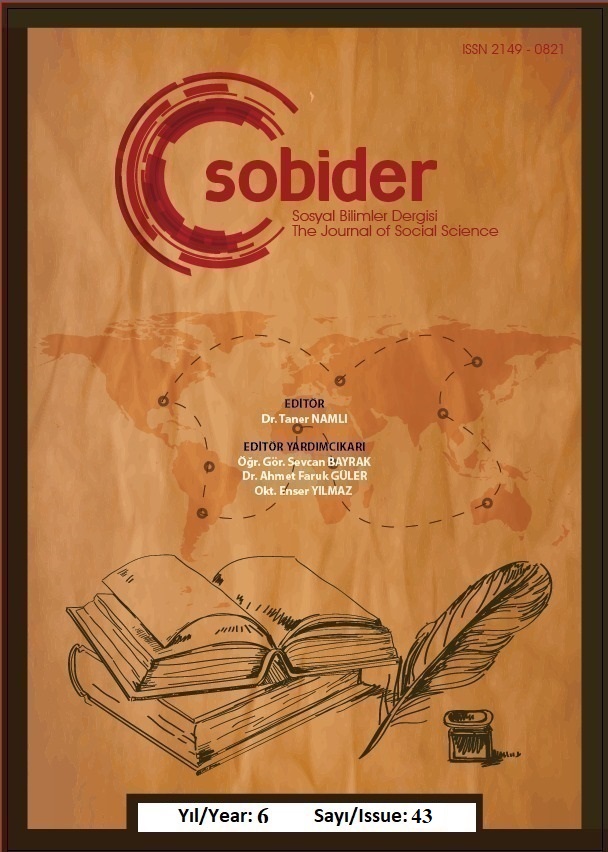Author :
Abstract
Bu çalışmada, Nobel ödüllü Rus yazar Mihail Aleksandroviç Şolohov’un (1905-1984) “Don Hikâyeleri” (Donskiye rasskazı) adlı eserinde yer alan erken dönem öykülerinden “Şibalok’un Dölü”nde (Şibalkovo semya) yaşamın içinden bir olgu olarak şiddet, gerçekliğin edebî metne dolaysız aktarılmasıyla belirlenen “yansıtma kuramı” ekseninde ele alınacaktır. Çalışma, edebî eserin özgün estetik değerlerinin oluşturulması sürecinde, kadına yönelik şiddetin kahramanın söylemleri yoluyla olağan ve meşru gösterilmesi problemini tartışmayı ve egemen söylemin kadının toplumdaki ikincil konumunu yeniden üreten bir araç olarak işlevsel kılınmasını, ilgili öykü örneğinde soruşturmayı amaçlamaktadır. Yazarın Şibalok karakterizasyonu, Fransız sosyolog ve felsefeci Pierre Bourdieu’nün (1930-2002) “simgesel /sembolik şiddet” kavramından yola çıkılarak çözümlenecektir.
Keywords
Abstract
In this study world famous Russian novelist and laureate of the 1965 Nobel Prize in Literature Mikhail Aleksandrovich Shlokhov’s (1905-1984) “Shibalok’s Seed” which was published as a part of the early stories “Tales from the Don” will be evaluated on the axis of reflection theory that defines direct reflection of violence to the literary text. The study aims to discuss the problem of the representation of violence against women as a common and legitimate phenomenon through the hero's discourse. In this context, the study aims to question the phallocentric language as a function of reproduction of women's secondary position in society in the case of “Shibalok’s Seed”. The characterization of Shibalok will be analyzed referring to French sociologist and philosopher Pierre Bourdieu’s (1930-2002) concept of “symbolic violence”.
Keywords
- Aleşçenko Ye.I. (2010). “Kontsept ‘Jenşçina’ v kazaç'ih skazkah” (Red. I.S. Karabulatova & G.S. Zaytsev). Kazaçestvo Sibiri ot Yermaka do naşih dney: istoriya, yazık, kul'tura: Sbornik materialov Vserossiyskoy nauçno-praktiçeskoy konferentsii, (10-12). Tyumen': Peçatnik.
- Aleşçenko, Ye.I. (2015). “Fol'klornıy obraz jenşçinı-kazaçki kak voploşçeniye stereotipov kazaç'yego sotsiuma” Izvestiya Volgogradskogo gosudarstvennogo pedagogiçeskogo universiteta, 7 (102), 97-103.
- Aleynikova, T.V. & Butırina, L.N. (2009). “Vırazitel'nıye vozmojnosti paremiy kak otrajeniye gendernıh otnoşeniy (na materiale romana M. Şolohova ‘Tihiy Don’)” Vestnik Taganrogskogo instituta imeni A.P. Çehova, 2, 22-26.
- Arhipenko, N.A., Vlaskina, T.YU. & Vlaskina, N.A. (2010). “Printsipı predstavleniya traditsionnoy kul'turı donskogo kazaçestva v tvorçestve M. A. Şolohova” Izvestiya Yujnogo federal'nogo universiteta. Filologiçeskiye nauki, 2, 8–24.
- Arseven, T. (2018). “Fakir Baykurt’un Tırpan Adlı Romanının Simgesel Şiddet Açısından İncelenmesi” Folklor/Edebiyat, 24 (93), 81-92.
- Asma, B. & Çetir, S. (2011). “Şolohov’un ‘Ve Durgun Akardı Don’ Adlı Eserinde Kadın, Ahlâk, Din ve Savaş Teması” Tarih Okulu Dergisi, IX, 73-90.
- Aylanç, M. (2016). “İsmail Bozkurt'un Romanlarında Realist Roman Kişileri ve Karakterizasyon” Folklor/Edebiyat, 22 (87), 43-52.
- Barnaşova, Ye.V. (2013). “Variatsii mimesisa v literature i iskusstve XIX v.” Vestnik Tomskogo gosudarstvennogo universiteta. Kul'turologiya i iskusstvovedeniye, 1 (9), 23-30.
- Bourdieu, P. (2015). Eril Tahakküm. (Çev. B. Yılmaz). İstanbul: Bağlam.
- Dubrovina, N.V. (2011). “Sotsialistiçeskiy realizm: metod ili stil'” Vestnik Tambovskogo universiteta. Seriya: Gumanitarnıye nauki, 99 (7), 181-185.
- Ermolaev, H. (2017). Mikhail Sholokhov and His Art. Princeton, New Jersey: Princeton University Press.
- Galaganova S.G. (2016). “‘Dve ulitsı’: tema sotsiokul'turnogo raskola kazaçestva v rasskazah Mihaila Şolohova” Kazaçestvo, 8 (21), 31-39.
- Goldmann, L. (2005). Roman Sosyolojisi. (Çev. A. Erkay). Ankara: Birleşik.
- Gürsoy, Y. (2018). Sovyet Dönemi Rus Edebiyatı (1953-1991). Ankara: Iksad.
- Homutinnikova Ye.V. & Murav'yeva Ye.E. (2004). Mihail Aleksandroviç Şolohov (1905–1984) Bibliografiçeskiy ukazatel' literaturı o jizni i tvorçestve. Moskva: Tsentral'naya gorodskaya publiçnaya biblioteka.
- Kandemir, H. (2008). “Destansı Bir Roman ‘Durgun Don’ ve Bir Yıkımın İzleri: Devrim, Savaş, Ölüm” Ankara Üniversitesi Dil ve Tarih-Coğrafya Fakültesi Dergisi, 48 (2), 95109.
- Karakol, G. (2014). M. A. Şolohov’un ‘Durgun Akardı Don’ Adlı Eserinde Kadın Karakterler. (Yayımlanmamış yüksek lisans tezi). İstanbul Üniversitesi Sosyal Bilimler Enstitüsü, İstanbul.
- Kormilov, S.I. (2010). “Vtoroy syezd sovetskih pisateley kak preddveriye ‘Ottepeli’” Vestnik Moskovskogo universiteta. Seriya: Filologiya, (4), 48-65.
- Litvinenko, N.A. (2009). “O rasskaze M. A. Şolohova ‘Nauka nenavisti’: zvonit kolokol” Rhema /Rema, (4), 24-30.
- Lunaçarski, A.V. (1967). Sobraniye soçineniy v 8 tt. - T.8. Moskva: Hudojestvennaya literatura.
- Moran, B. (2002). Edebiyat Kuramları ve Eleştiri. İstanbul: İletişim.
- Paneş, U.M. (2010). “Ob evolyutsii metoda i osobennostyah realizma XX veka” Vestnik Adıgeyskogo gosudarstvennogo universiteta. Seriya: Filologiya i iskusstvovedeniye, (3), 46-49.
- Polat, O. (2016). “Şiddet” Marmara Üniversitesi Hukuk Fakültesi Hukuk Araştırmaları Dergisi, 22 (1), 15-34.
- Spiridonova L.A. (2018). “Tvorçestvo Gor'kogo i vozniknoveniye sotsialistiçeskogo realizma” Studia Litterarum, (1), 212-233.
- Suhih, S.I. (2013). “Evolyutsiya doktrinı sotsrealizma vo vtoroy polovine XX v.” Vestnik Nijegorodskogo universiteta im. N.I. Lobaçevskogo, (2-1), 300-305.
- Şolohov, M.A. (1925). Şibalkovo semya. http://www.lib.ru/PROZA/SHOLOHOW/semya.txt (E.T. 30.03.2019).
- Şolohov, M.A. (2000). Don Hikâyeleri. (Çev. M. Ergin). İstanbul: Cem.
- Tekeli, S. (2018). Rusçanın Söz Varlığı Açısından Mihail Şolohov’un ‘Durgun Don’ Eserinin İncelenmesi. (Yayımlanmamış doktora tezi). Erciyes Üniversitesi Sosyal Bilimler Enstitüsü, Kayseri.
- Titareva, L.D. (2010). “Literatura kak sredstvo ideologiçeskogo kontrolya v sovetskoy kul'ture dovoyennogo perioda” Gumanitarnıy vektor. Seriya: Pedagogika, psihologiya, (4), 166170.
- Türk Dil Kurumu-Büyük Türkçe Sözlük (“kendiliğindenlik”) http://www.tdk.gov.tr/ (E.T. 30.03.2019).
- Voskresenskaya, V.V. (2018). “Iskusstvo kak sredstvo mirostroyeniya: sotsialistiçeskiy realizm (1930-ye godı)” Hudojestvennaya kul'tura, 1 (23), 166-199.
- Zaharov, A.V. (2006). “K voprosu o vozniknovenii termina ‘Sotsialistiçeskiy realizm’” Vestnik Sankt-Peterburgskogo universiteta. Seriya: Istoriya, (1), 107-118.





